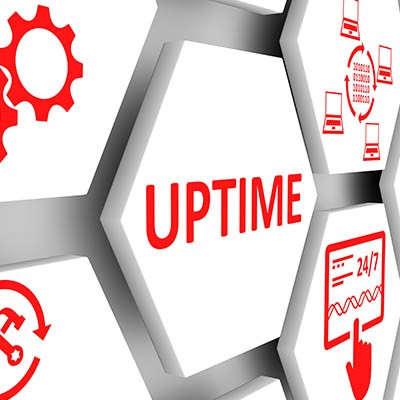Directive Blogs
Tech Term: Uptime
In managing business technology, we are always talking about downtime--how expensive downtime is, how downtime hurts productivity, how there are a multitude of separate situations that can cause downtime. That kind of doom and gloom may not get you to act, but it may just put you off. Today, instead of downtime, we thought we would talk about uptime.
Uptime: The Anti-Downtime
Obviously, if downtime is something to be avoided, uptime--the reciprocal state of operations--is to be embraced. Uptime means that all of your IT is working as intended and your staff is able to produce their greatest output. At Directive, we do what we can to avoid risk, and as a result, we typically focus on avoiding downtime and providing as much uptime as possible. The question becomes how often is your IT completely functional and working for you?
The typical business has a lot of different elements working to make up their information systems. They have servers, workstations, networking equipment, printers and copiers, and much more. In fact, if each piece of your IT infrastructure has 99% uptime (they likely don’t), what are the chances that each piece is down at the same time? Uptime as a metric actually corresponds with productivity more than any other. In fact, if someone isn’t being productive when all the IT they need and use is running effectively, they are missing an opportunity.
We work hard to ensure that uptime is maximized. We constantly monitor and manage hardware, monitor networks, and put state-of-the-art tools to work that only have one job, eliminating any downtime. That’s why it is important to define the level of success that is provided by each service and system as they are available in real-time. Think about it, if you provide an employee a workstation that routinely needs support, and another a brand-new workstation that doesn’t have any technical deficiencies, can you really expect both of them to be equally productive?
In the IT world, uptime is the goal, insofar as it gives the end user the best chance at achieving success.
How We Can Help Build Uptime
As stated above, our whole business model is based on the uptime/downtime paradigm shifting dramatically in our clients' favor. We try to accomplish this in several ways. These include:
- Hardware procurement - We attempt to set our clients up for success by offering reliable technology that will work to meet their needs 100 percent of the time.
- Professional installation - Not only will we help procure solid technology, our professional technicians will configure, test, and install all computers, include all necessary peripherals and ensure that each server and workstation has the working software necessary to provide maximum productivity.
- Bulletproof networking - Networking is a huge part of the modern workplace. We set up all wired and wireless network connections, routers, switches, and all other network related equipment to the highest standards. This ensures that data flow and network access are optimally set up and maintained.
- Remote monitoring - For information systems to maximize uptime, there have to be proactive efforts made. We remotely monitor and maintain all network attached machines, eliminating any significant downtime in the process.
- Backup and Disaster Recovery - Having a redundant and actively available data backup is proven to reduce downtime in the face of a data loss scenario.
- Help Desk - If end users have problems with their individual workstations, our comprehensive help desk service is a great resource to resolve problems and reduce downtime.
If you would like to talk to one of our expert consultants about how we can help you get control over your IT and work to reduce or eliminate the downtime your organization experiences call us with your story at 607.433.2200.


